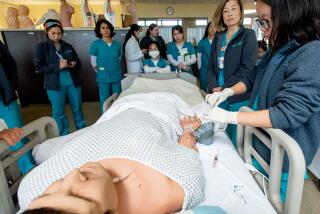Plan to Spur Early Retirements Works for College District
Administrators and faculty members are retiring in increasing numbers from the trouble-plagued Ventura County Community College District, taking advantage of the “golden handshake,” an incentive program that pays them to retire early.
This year 19 employees are retiring under the program. Next year college officials expect the number to be even higher.
“We didn’t anticipate this many,” said Jerry Pauley, associate vice chancellor of personnel for the district. “I think it’s been wildly successful.”
The exodus comes as the district grapples with a series of scandals. A trustee is on trial for allegedly padding travel forms, a college president is on the verge of being fired, and an administrator faces a possible reprimand. But district officials say the 19 retirees, who include the administrator, are not leaving because of the district’s troubles.
“They were ready to retire,” Pauley said. “The golden handshake is a good deal. They decided to take it.”
Under the program that ends in 1992, employees who notify the district that they will retire are credited with two extra years of employment service. For most employees, that adds $100 to $150 a month from the district to their benefits from the State Teachers Retirement System, Pauley said. For some top administrators it adds more than $200 a month.
District officials say the program benefits not only retirees, who collect more money, but the district, which hires replacements at lower salaries. Pauley said the savings to the district for this year is estimated at about $100,000.
For the typical employee under the State Teachers Retirement System it works this way: A 60-year-old employee earning $38,000 a year would retire after 25 years of service with annual retirement benefits of $19,000 a year, said Gloria Pollock of the county superintendent of schools office. The golden handshake benefit adds another $1,512 a year.
For Ventura College President Robert Long, who announced in May that he would retire next June from his $94,043-a-year post, the bonus could mean about $225 a month in additional retirement benefits. That would boost his annual retirement pay to more than $50,000 a year, depending on how he structures his benefits.
“This encourages old fogies like me to get out, so that a younger person can come in at a lower salary,” said Long, 56, a veteran of 35 years in education. “It stimulates new blood.”
His wife, Alicia Long, dean of general and transfer education at Moorpark College, is also retiring under the program.
Robert Long, who has been untouched by the controversies in the district, said, “I’m certainly not retiring because of issues in the district. There are other things I want to do before I have one foot in the grave.”
Another golden handshake retiree is Lawrence Lloyd, Moorpark College’s vice president of administrative services. He was told by trustees last month that they intend to reprimand him for his role in the transfer of money from the college to its private foundation. He announced last week that he will retire at the end of next school year.
But Lloyd, 57, who earns $81,020 a year, said last week that he is not retiring because of the reprimand; he had planned all along to take the golden handshake.
Chancellor Barbara Derryberry, 58, is also an early retiree. She announced a year ago that she would give up her $112,000-a-year post this month.
However, her replacement will not save the district money. Incoming Chancellor Thomas Lakin will earn the same salary that Derryberry does.
State law allows school districts to offer the retirement incentive if they can show that it will save money. From 1986 to 1990, the college district and 11 other school districts in Ventura County were among 421 in the state that offered it.
The benefit was limited to employees 58 to 60 years old, but last year legislation opened it to all employees, including those older than 60. That accounts for the large number of retirees this year and next, district officials say.
Last October, college district trustees voted unanimously to offer the program to faculty and management during 1991 and 1992. They could have extended it to 1993 under the law, but Pauley advised against it.
“If you offer it every year, it is just a benefit,” Pauley said. “We wanted it to be a retirement incentive to be taken now.”
Although 12 school districts in the county have offered the program in the past, some are passing it up now because it is financially too risky during tight budget times. Conejo Valley Unified School District is one of those.
“The only time you save is if a person retires who wouldn’t ordinarily,” said Sarah Hart, assistant superintendent for business services. By offering it to people older than 60, the district doesn’t save because those people would have retired anyway, she said.
For some districts, such as Pleasant Valley School District, it still saves money. Ken Marshick, director of personnel, estimates that the district may save about $250,000 in salaries over the next two years because of employees who plan to retire early.
For the college district, the program is proving financially beneficial, but the exodus also leaves a “talent drain,” Trustee Timothy Hirschberg said. However, the district, like others, must cut spending, he said.
“State funding is increasingly more precarious,” Hirschberg said. “We are looking everywhere to save.”
More to Read
Sign up for Essential California
The most important California stories and recommendations in your inbox every morning.
You may occasionally receive promotional content from the Los Angeles Times.










